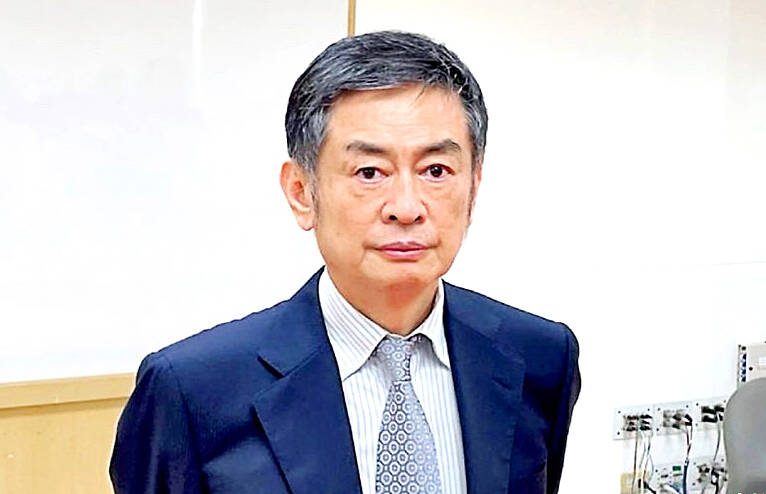Largan Precision Co (大立光), a major camera lens supplier for Apple Inc’s iPhones, yesterday reported record profit for last quarter and predicted revenue in the first two months of this year would surpass the figure in the correspondent period of last year.
The Taichung-based company also said it has tapped into the humanoid service robot market and started delivering plastic camera lens samples to multiple customers.
The company is designing camera lenses for collaborative robots, mostly robotic arms deployed in factories, Largan chief executive officer Adam Lin (林恩平) told investors.

Photo: Ou Yu-hsiang, Taipei Times
“This is new. The specifications for humanoid robots are lower than those [camera lenses] used in smartphones currently, but it is unclear how the spec will vary in the future,” Lin said. “The visualization of a humanoid robot requires at least two camera lenses for a humanoid robot to have vision to avoid collision and have night vision.”
During the final quarter of last year, net profit soared to NT$8.68 billion (US$263.6 million), almost doubling from NT$4.97 billion a year earlier, Largan said. That represented a sequential growth of 31 percent from NT$6.63 billion.
Largan attributed the growth to extra bonuses granted by major customers, rewarding the company’s strong shipment performance based on a two-year agreement.
“We have been receiving bonuses from customers usually for minor projects, so the amount did not stand out. It never happened to major projects before,” Lin said. “We have secured new agreements with customers for 2025. We may receive bonuses if we hit the shipment target set by customers.”
Last year as a whole, Largan’s net profit surged 45 percent year-on-year to NT$25.92 billion from NT$17.9 billion in 2023. Earnings per share jumped to NT$194.17 from NT$134.13 in 2023, the highest level since 2019.
Gross margin climbed to 59 percent last quarter, compared with 50.24 percent the previous quarter and 52.8 percent a year earlier, on the back of better product mix, the company said.
Lenses with a resolution of 20 megapixels or greater — a higher-margin product and one of Largan’s specialties — accounted for 20 to 30 percent of the company’s shipments last quarter, higher than the 10 to 20 percent in the previous quarter.
Ten megapixel lenses made up 60 to 70 percent of shipments last quarter, unchanged from a quarter earlier. Eight megapixel lenses comprised about 10 percent, the same as the third quarter last year. Other products such as coil motors contributed a lower portion of 10 percent of total shipments, versus 20 to 30 percent in the third quarter last year, the company said.
However, Largan said gross margin would not reach such high level again in the foreseeable future.
Largan spent NT$10.7 billion on new facilities and manufacturing equipment last year, with depreciation costs amounting to NT$5.8 billion, it said.

When an apartment comes up for rent in Germany’s big cities, hundreds of prospective tenants often queue down the street to view it, but the acute shortage of affordable housing is getting scant attention ahead of today’s snap general election. “Housing is one of the main problems for people, but nobody talks about it, nobody takes it seriously,” said Andreas Ibel, president of Build Europe, an association representing housing developers. Migration and the sluggish economy top the list of voters’ concerns, but analysts say housing policy fails to break through as returns on investment take time to register, making the

‘SILVER LINING’: Although the news caused TSMC to fall on the local market, an analyst said that as tariffs are not set to go into effect until April, there is still time for negotiations US President Donald Trump on Tuesday said that he would likely impose tariffs on semiconductor, automobile and pharmaceutical imports of about 25 percent, with an announcement coming as soon as April 2 in a move that would represent a dramatic widening of the US leader’s trade war. “I probably will tell you that on April 2, but it’ll be in the neighborhood of 25 percent,” Trump told reporters at his Mar-a-Lago club when asked about his plan for auto tariffs. Asked about similar levies on pharmaceutical drugs and semiconductors, the president said that “it’ll be 25 percent and higher, and it’ll

CHIP BOOM: Revenue for the semiconductor industry is set to reach US$1 trillion by 2032, opening up opportunities for the chip pacakging and testing company, it said ASE Technology Holding Co (日月光投控), the world’s largest provider of outsourced semiconductor assembly and test (OSAT) services, yesterday launched a new advanced manufacturing facility in Penang, Malaysia, aiming to meet growing demand for emerging technologies such as generative artificial intelligence (AI) applications. The US$300 million facility is a critical step in expanding ASE’s global footprint, offering an alternative for customers from the US, Europe, Japan, South Korea and China to assemble and test chips outside of Taiwan amid efforts to diversify supply chains. The plant, the company’s fifth in Malaysia, is part of a strategic expansion plan that would more than triple

Taiwanese artificial intelligence (AI) server makers are expected to make major investments in Texas in May after US President Donald Trump’s first 100 days in office and amid his rising tariff threats, Taiwan Electrical and Electronic Manufacturers’ Association (TEEMA, 台灣電子電機公會) chairman Richard Lee (李詩欽) said yesterday. The association led a delegation of seven AI server manufacturers to Washington, as well as the US states of California, Texas and New Mexico, to discuss land and tax issues, as Taiwanese firms speed up their production plans in the US with many of them seeing Texas as their top option for investment, Lee said. The